Episode 2: Leadership vs Getting Along
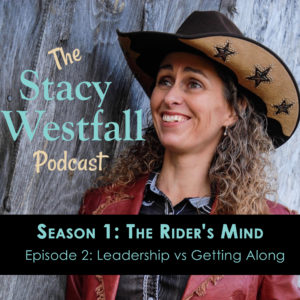
Today’s podcast topic walks the line between the mental idea of leadership versus the physical execution of leadership. I’m tempted to talk about the physical side of this topic, but season one is about the mental side.
I want to break everything down into the four-quadrant model, so we can get clarity before we put everything together and use it. In this episode, I’ll be talking about how leadership is different from just getting along and how it impacts the way we show up with our horses.
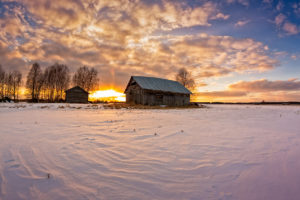
Subscribe and never miss an episode! (I listen in the barn and when I’m out driving)
Subscribe Free
Need help subscribing? Here are two video links that will walk you through subscribing to a podcast. I didn’t make the videos so be sure to search for Stacy Westfall after you download your podcast player!
How to Subscribe to a Podcast on an iPhone: https://youtu.be/9SD8z3VJua4
How to Subscribe to a Podcast Using Stitcher App for Android:https://youtu.be/FKxnFAmNEtE
“There is always an element of leadership for me in the relationship with my horse. Even though, I absolutely fully want to know them as who they are.” Stacy Westfall Click To TweetShow Notes
[00:54] The four square model is a really simple tool for breaking down complex problems.
[01:29] In this season, I’m focusing on the rider’s mind.
[01:31] This episode is about the idea of leadership and how it is different from simply just getting along and how this idea impacts the way that we show up with her horses.
[01:48] The interesting thing about this topic is how it walks the line between the mental idea of leadership and the physical idea of leadership.
[02:22] Horses are hardwired to look for a leader. If they don’t find a leader, they are compelled to step into that role.
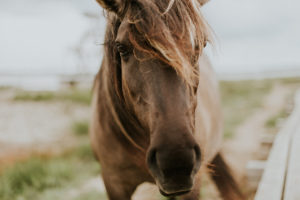
[03:13] Some horses are more mild-mannered and some are more strong-willed.
[03:44] Jane shares an email about how her horse won’t go around the ring.
[04:27] Natural horsemanship came out with the idea that horses have emotions. If we recognize these emotions, we can use them to change the horse.
[05:10] Some people have used this idea as an excuse to just “get along”.
[06:06] There’s nothing wrong with wanting a relationship with your horse.
[06:38] You can have an element of leadership in your relationship with your horse while still knowing them as who they are.
[07:28] Leadership is about actually taking the responsibility inside that relationship. You are responsible for your horses safety and what happens with your horse.
[08:03] An email from Amy about her new horse.
[09:46] Grandma’s rules. Between human relationships, there is a distinct difference between what different adults will allow. If children can determine this, so can horses. Grandmas rules are when horses notice the difference between handlers.
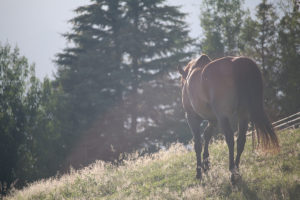
[11:12] Guilt can affect riders and what they are willing to ask for.
[13:12] If a horse’s state of mind is going to impact the training a lot, we have to admit that some horses are more strong-willed.
[13:54] What is your first gut reaction when I say you need to be a better leader? Do you show up feeling guilty when you ask your horse to do something.
[14:40] Are you trying too hard to be perfect and not giving the horse any responsibility?
[15:50] Your challenge for the week is to write down one place where you have really great leadership skills and one place where you need to improve.
“If a horse's state of mind is going to impact the training a lot, we have to admit that some horses are more strong-willed.” Stacy Westfall Click To TweetLinks and Resources:
- Blog post on Stacy wrote about the 4 Square model: Quickly Evaluating Problems with Horses and Riders
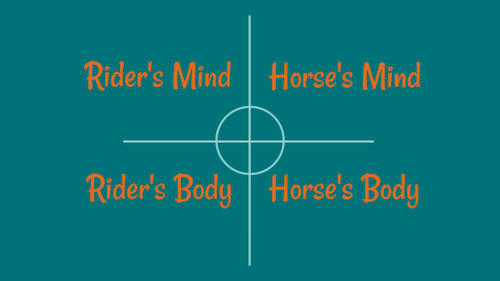
The 4 Square Model Stacy uses when approaching horse and rider challenges.
Subscribe Free
120 Comments
Leave a Comment
SUBSCRIBE TO THE PODCAST HERE:





YOURS FREE
WHY IS MY HORSE...?





Thank you Stacy! I enjoy your topics and honesty. This has helped me a lot with that balance.
As a teenager I taught riding lessons at a local boarding barn. This was an issue I had with certain lesson ponies and horses. They would behave beautifully for some riders and refuse to move a hoof for others. Seasoned lesson ponies quickly learned which students they didn’t have to work for. As a teenager I didn’t understand it and struggled to help students who were not natural leaders. Later I found that ground work, specifically round pen work on a basic level, helped to boost student’s leadership skills and improve communication. Great podcast, can’t wait to hear more!
Wow, very interesting!
Podcast was great… One thing I didn’t expect was enjoying reading the other listener comments this much! I am very guilty of having “Grandma’s rules”… I find that I want the connection to be there so I don’t enforce my personal space rules enough. I have a 8 month old mule baby and these podcasts are making me re-think a lot of things I have allowed her to do… no more “Grandma” time from here on out!
Another great podcast – this time about Leadership vs Getting Along. Leadership does not come from fear or anger but from fairness and firmness. We must be black and white with what we want our horse to do and have clear direction and focus when asking our horses. It is the horses responsibility to find the right answer and our responsibility to reward the horse for offering the right answer – no matter how small always reward the slightest try. Horses are so perceptive and read our body language whilst we are walking down the raceway, unhitching the gate, and entering the paddock – they have already picked up on where we are in the leadership stakes. It is so true about when you mention the experienced handler vs the not so knowledgeable. Have heard many stories where people send their horses to a trainer and when they get their horse back the horse is awesome, however things change very quickly because the horse knows where the owner is at and unfortunately due to this many trainers get bad reviews. It is also very true that if we improve our leadership skills in every day life this will also reflect on us being a better leader for our horse.
I absolutely agree that horses will naturally look for a leader! With my clients, the first day I work with them I have them show me the problems they have and what they want to change. So far, all of them have had horses that don’t lead respectfully and act like their owner isn’t there. I will take a hold of the lead rope, and the horse’s head will come down, they’ll stay next to me but not on top of me, they’ll stop when I stop, etc. The owners will look at me with disbelief and say something along the lines of “how did you do that? You didn’t do any training!” And I tell them, a horse will be a great follower if you’ll be a great leader. Then in further sessions I will teach them skills to become a confident leader and become more aware of their body language. But it is definitely a “mind game.”
Thank you so much for explaining leadership in this podcast, Stacy! I’m really good at being a confident leader on the ground, especially when leading my horse, but I lack confidence in my leadership under saddle. I go back and forth between being too soft (and my horse doesn’t understand what I’m asking) to being too rough (and I feel like I’m hurting them). You’re right, it’s definitely a mental and physical thing!
I really like how you define leadership! Before listening to this podcast, I knew that leadership was important, but I was unsure how to approach it (from a “bully/ bossy/ telling them what to do” approach or a “friendship/ asking them to do something” approach. Now, I think that consistency, a mixture of the two approaches, and education about body language (pain vs. sleepiness) is the best way to think about it. You’re completely right though, it’s very difficult to separate the rider’s mind from their body. Thank you so much for making these podcasts, Stacy!
You create a much stronger bond with horses when they want you to be their leader and they want to follow you and please you.
First at all thanks for making this podcast, I love it! In this one one of my mares instantly was in my mind. She is the boss in the herd, and although she never ever even tried to boss me around the bad way (kicking, biting, threatening) she wouldnt give up her position when I started working with her, there were days I sat there crying because she wont do anything, so I started to go on the trail, put down the reins and wait for her to go, it got better and better all I needed to do was to give her something in return and it resulted in giving her some space to make decisions sometimes so then she would let me be in charge again. These are tiny things that just made a team out of us and we now have a 100% trust relationship, when she gets scared of something she follows me without questioning and the other way I feel she takes care of me too.
Great information and I like how you explain it. Grandmas rules is definitely a thing and I often think of horses like a 3 year old, smart and always trying to get their way, I am a grandma so I relate to this ? I liked the part about reading the horse and guilt with putting pressure on. Makes sense ! Looking forward to more podcasts!
Hi Stacy. This podcast hits the mark and not only applies to horse training and the relationship with your horse but also life in general. I began to think about times I chose to “get along” instead of setting clear boundaries and expectations for both my horse and people. All benefit from the understandings and truth that result from kind and respectful leadership. This podcasts makes some great points and causes me to think and reexamine how I interact not only with my horse but with my fellow team members at work. Well done and Thank you.
Leadership is key! I agree hole heartedly.
I like your example about grandma’s rules. Good example and makes me laugh. I have learned that I have to have good leadership skills with Hildy and I always have to have a plan when I ride her–not necessarily on the trails but in the round pen or in the arena I have to have a plan. I have to be really focused and be thinking about what I want during that session. She needs guidance and reassurance from me. The instance that I am not sure about something–she knows. I love how we know each other so well–Of course there is always room for improvement and always new skills to learn but in general she knows when I am serious and have my game face/body language on and she also knows when I don’t. She has me trained in certain instances. LOL For instance, I used to ride on the trail with friends and there maybe something that I think may spoke her. I would look at it and think to myself–I bet she is going to spoke at that–sure enough she did. Now I don’t even look at scary things on the trail and she ignores them. It is AMAZING how horses can ready the riders mind/body language. I witness it all the time.
Another great session. I agree and constantly teach that leadership is key. Either you are leading or your horse is. My friends and students know what they need to do but don’t want to be unkind. I try to lead by example and show them that their horse is capable of being accountable. They say that “sure he will behave for you”. I think sharing this episode with them will be one more example of how their horse can be accountable to them too.
I like the Grandma rules example, I often see this as I work with New horse owners. Horses are so smart and figure out quickly who has what rules and what they can get away with. Thank you for the pod cast?
I love the Grandma’s rule explanation it is a good reminder to me not to be to much of a Grandma and take on more leadership when it is needed.
In the roundpen with my rescue i have great leadership, he gets it and knows I am in charge. Out of it he has become more pushy and I tend to let him. I need to be the leader all the time and not just “at work.”
Love this one I’m a leader at work and I bring that home with me. I really ask the horses nothing that is beyond their capabilities. I enjoy seeing the love and see the respect my horses have for me.
This one speaks to my soul. It’s like you looked inside my brain and said everything I had ever thought. With most horses I have no trouble being the leader… but my mare and I always fight each other. And I feel guilty whenever I put the saddle on her. But also feel guilty when I don’t. I’ve really gotten my confidence shook on her when she tried to buck me off on the trail. She has no confidence when I ride her. And I blame myself for it. Can’t wait to listen to more.
Stacy, I really appreciated the inside in this podcast! After having lost my horse of many, many years… The one who basically raised me… I have actually struggled with this quite a bit with my younger horse since his passing. Being so desperate for the connection I had with the past horse, I almost expected to double the passion I put into the horse I’m still blessed enough to have. As a result, there were definitely times when he thought he had to step into the leadership role since I was no longer really doing that. It’s amazing how I can go from having the full attention and respect of three horses all at once to being a wimp, but that’s almost what happened! Thank you for this great reminder to keep in mind. Though I’m not in the crummy place I was just a year or two ago with him, and I’m definitely in the leadership role more than I’m not, I still find myself sometimes being a lot softer than I need to be for his own good mind and benefit.
I love learning, thank you so much. I am a leader to my horses because they know they can count on me, I am a not a leader when I let them have their way. Homework accepted. :O)
I need to listen to this every day and remind myself that I am the leader and stop being afraid to show it!
When my soul mate buckskin died of old age, I was in the process of training my App that I ride now. While grieving the loss of Buck, I was lulled into letting Apache into the leadership position. I guess it was because Buck and I had been together so long it was truly a partnership, although he did accept me as the leader. It seems I was allowing Apache into the partner position before he was able to fully understand my leadership. Things eventually worked out, but it was a long process. I wish I had seen this podcast way back then.
I’ve seen how giving the horse responsibility in the simple task of leading, makes them a different horse. By trusting your horse to stay next to you and correcting them if they don’t (rather than always holding them next to you on a short lead to make them stay there) can very quickly change a horse that is dragging you around into a polite, easy to lead horse. I try to always vary my speed when leading my horse anywhere to help them pay attention and I lead them on a loose rope. Thank you for another very informative podcast!
Great podcast, just subscribed so I can keep up with your posts. Merry Christmas!!
I am one of the people who try to hard to be perfect, and I don’t give my horses much responsibility. I have to good leadership role with my two older mares, we get along great. I still am working on developing it with my youngster – I got sick right after he started under saddle, so my trainer has done all the work with him, and I haven’t. This coming summer I am hoping that will change!!!
That was another awesome podcast
Again that was super Stacy!!!?
And was exactly what I needed to hear as I continue to work with my boy!! I was thinking that I was being to hard on him because hes a rescue, but we have come a long ways in a in a short period of time and I think hes just waiting on me to push him the right direction and be a gentle but strong leader!!?
I’ve got to keep my head thinking about what he needs most, not just my heart about all hes gone through.. it’s over now ard he has a great home with lots of love and I think a pretty decent trainer? lord willing we should go a long ways together!!
Thanks again!!!? God bless you and yours this Christmas season!!
I want willing partnership from my horses. Since everything I ask of them involves them making my choices become their own, it is my responsibility to be the leader they naturally want a relationship with. The unity I want with my horses requires that I hold up my end of the responsibilities in the relationship, and be the leader. The ideas that we can go without that seem very unnatural to me after watching horses at pasture and in the wild all my life. That being said, one of my strengths as a leader is that my leadership is adaptable to the individual horse’s needs. Leadership is not a “do what I say” authoritarian thing, especially with some horses more than others. It is part of a working, two way relationship where we both get to utilize and develop our strengths. As one example, I am a great leader at gates and while horses are at pasture or otherwise freely being together. Leading through gates, they do not push or pull or otherwise try to lead me. They stay soft, they turn around and ‘help’ me close the gate. If I am bringing one horse in or out, the others are to give space and be polite. And do. At pasture, they are not allowed to push other horses around when people are there. I take the time and give the consistency to make sure they be aware and safe around people even while free and in their own personal space. An example of poor leadership from me? Standing still for mounting. I can train it very well in horses I am not keeping, and in horses I start for myself. But pretty soon I inadvertently train my own riding horses to walk off as I mount. I KNOW the answer to this well. I break the habit in myself and them repeatedly! Lol. It is one thing that I find myself only ever temporarily improving on. Years of consistency go by, and then I start letting it happen again. I subconsciously can’t wait to get on and go, have a hurried feeling, and then let them walk off and I just start riding happily. Which of course teaches them to do just that, when what I really want is for them to stand still properly and wait for my intended cue to go. Putting my foot in the stirrup is not my intended due to go 😉
Love this! Another great podcast
Lots of food for thought! I have a strong willed horse but she also is low on the totem pole in the herd, or as you said a follower, and not the leader in the herd. So it’s an interesting dynamic that she shows up so strong willed when in the human/horse relationship. It lets me know maybe my leadership skills need to be strengthened. The other point was that not all the responsibility is mine, some belongs to the horse. In a lot of circles it is common to say that if anything goes wrong it is always the human and never the horse. But I think sometimes, it is the horse…. Lots to think about!
Yes! I have waaay better leadership on the ground! All goes back to one of the 4 quadrants- Riders Mind!
I’ve gotten myself so stuck (literally) lol with pushing her under the saddle. And the little turkey butt knows it!! We have an amazing on the ground relationship, like really truly is magical at times. But I’ve got a mental block at having to be more forceful to get her moving… So she plays this game with me where she will slow poke barley budge and than when I persist she’ll move but go into a full run thinking I won’t like it and get tired and want her to stop, but it backfires on her because we get in a good rhythm together and have a little fun for a couple minutes until she realizes that wasn’t her plan and than she goes to slow poke barley budge again. And than the whole cycle starts over. Until she wins and I do get tired of trying to get her to go… Cuz I don’t want to have to kick her…
One place I have great leadership skills is im school, but the place I need to improve them is at home. Thank you for your input!
You can’t become your horse’s master if you do not first become you own. Your podcasts make me think of good points, and focus more on myself than on my horse all the time.
I really thought your clinic example highlights that people really need to move beyond their feelings of “guilt” when working with horses, to really become an active participant who can watch and interpret a horse’s behavior correctly. When a person can really monitor their horse’s expressions and correctly interpret what a horse is thinking, and then react to the horse accordingly, then they can become a leader their horse can respect.
Thank you for another thought provoking pod cast! I often give people with little or no experience a little lesson and if they are doing well, a short trail ride. One of the 1st things I stress is, there is only one boss. It will be you or the horse. It better be you. Be kind, but be firm and give clear signals.
I remember one instance where a girl on a borrowed horse would not cross a creek. She was not being firm and it escalated to a point where the horse was really misbehaving badly, dancing around on the bank and he actually reared up! At that point the owner asked the girl to dismount and the owner got in the saddle. Before her butt actually touched saddle, the horse gingerly moved forward crossing the creek! He knew the boss was back in the saddle! It was like he was saying, “Oh! you meant THIS creek! No problem!” Horses are alot smarter than we sometimes give them credit for.
Great ideas!
The place I have NO problem being the leader is in the stall. There are behaviors I expect: Go to the far wall when I bring your grain in, NO crowding me, NO rearing, kicking, biting, etc.
My horses lead quietly, know the routine when I bring them in from the pasture…I call them my Fine Gentlemen.
Where I have trouble is when we have a “difference of opinion” during a ride. If I can’t get them to see it my way after several attempts, then I blame myself that I am not asking in a way that they understand, so I go back to something I know that they can do. Then I spend the next several days trying to figure out HOW to ask properly…but the requested task still was not achieved. Keep it hoof side down!
Thanks so much for this!I too am guilty of thinking I’m asking too much and constantly check myself for that.I understand it a whole lot better now? Blessings!!
Your insight into what seems so simple and yet is missed by so many of us is spectacular!
My daughters are all inspired by what you do and how you do it.
Thank you for being a great teacher and opening up the minds of all of us.
I love your training ideas!
I never try to be a leader for my horse … together we create unity, we are partners for good and for bad … hard work made us inseparable … and every trip to the arena or in the area is a pleasure for me as well and for him
Wonderful example on the leadership vs getting along.
It makes me think of the relationship between a Mother and child. The mother is the leader to her child for direction, knowledge, help, and for care. A Mother truly cares and loves their child but there are times when she needs to be stern, maybe even discipline in some way to teach the child a lesson. Many of time it’s for the safety of the child. There are times where the child could be angry at the mother but at the end of the day, there is no one else the child will run to first for love and nurture.
I believe a horse and owner relationship could be similar.
Leadership is like being a mom. You have to be lovingly firm. I let them know by the tone of my voice if that’s acceptable. Like your kids every horse is different. Some you just look at and others you push you as far as they can. Once they submit sometimes they become the better horse.
ANother great topics to listen to to learn. Thanks
Excellent distinction made of leadership versus placating.
This has helped me figure out why I let my horses get away with more than I let other people’s horses get away with! I want to get along with mine so they get a little spoiled, but other horses I feel like I have more of responsibility to be a leader and get the right responses so I don’t spoil them at all.
I feel like such a big part of leadership is communication over command. In communicating with my horse I would like to hope that my aids to him are communicating rather than commanding. It should be a partnership. I do feel like I am a really good leader to my horses and I think that in working with multiple horses it has allowed me to expand my skillset and understanding in so many ways…but I am always seeking techniques to communicate with my horses that require the least amount of micro managing. Allowing the horse to be responsible for themselves instead of instructing every little nuance. A question I often ask to myself is, how can I communicate to this horse that he doesn’t have to do is much as hes doing without confusing him? How can I make him understand that the right thing is easy and the wrong thing is hard? Some aspects of horse training are easier to brainstorm than others! I love horsemanship theories. They really get my mind turning! I like to delve into the instinctual side of horses and the why and how of everything.
Stacy, once again you nailed it so beautifully in this podcast. I love how you helped the rider to understand what their role of leadership looks like as a rider in such an informative way. I also liked the illustration you gave about the horse having responsibility too such as if a bear attacked the horse and the horse didn’t run. It’s a good reminder that there is a give and take in any relationship! How you touched on how guilt can keep us from being the leader we should be was very empowering! Thank you!
I like what you have challenged us to do. Leadership with your horse it so important! I look forward to your podcasts, their awesome. I’m so glad your doing this. Thank you!